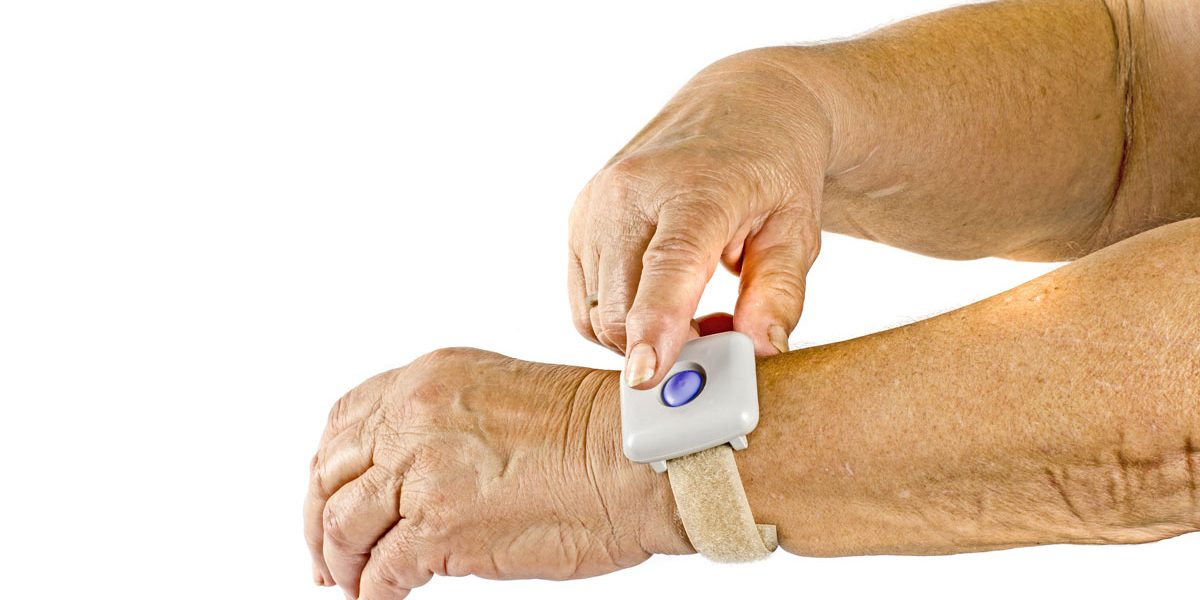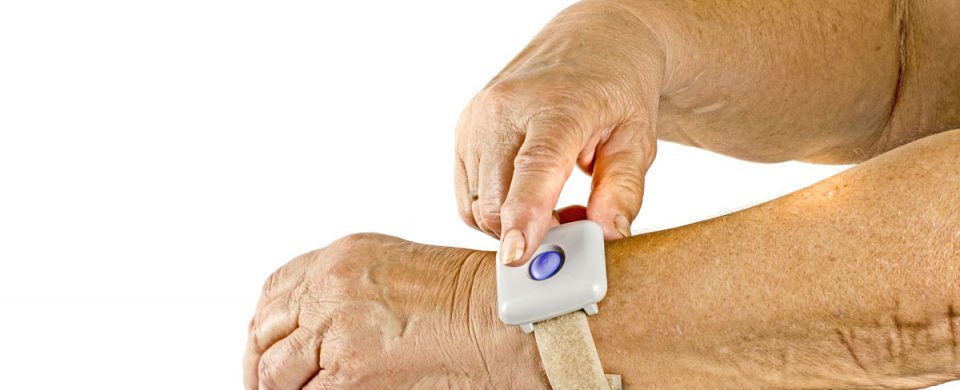
Find the best medical alert system for seniors in Edmonton

As of 2006, 1 in 5 Edmonton residents was 55 years or older. Studies estimate that by 2041, 1 in 3 people in the city will be a senior. With the senior population growing, safety and security has become a top concern.
As many of our seniors live as a couple or alone, the question of how to get quick assistance in a medical emergency is very important. Fortunately, medical alert systems address this concern with wearable panic buttons that are quick and easy-to-use.
If you are a senior or worried about a senior family member, find out more about medical alert systems in Edmonton.
Just fill out the form below and receive FREE and NO-OBLIGATION offers from reliable companies in your area!
How do medical alert systems help seniors?

Seniors in Edmonton are also busy- they attend church, volunteer in their communities, exercise, and enjoy their retirement.
Thus, wearable and mobile medical alert systems with personal panic buttons are very convenient. Because a senior can quickly summon assistance in an emergency no matter where they are, they provide peace of mind, independence, and confidence.
Medical alert systems come in different forms and models and each one is tailored to different lifestyles and needs.
Whichever type of medical alert system you choose, the primary benefit is GUARANTEED and FAST access to EMERGENCY SERVICES.
Monitored medical alert systems offer 24/7 emergency assistance so that seniors can live independently without fear.
In-Home Medical Alert Systems
In-home medical alert systems are designed for seniors and at-risk individuals who often stay home alone.
In case of a medical emergency, a user can simply push the panic button integrated in the wearable pendant or bracelet to call for help.
These medical alert systems come with a base console and a wearable device with a panic button and built-in speakerphone. When the user pushes the button, he or she is instantly connected to a live emergency operator for assistance.
The device is also waterproof or water-resistant and can be worn even in the bathroom where most slips and falls occur.
In-home medical alert systems are connected to landlines and are the most standard and affordable systems in the market.
Cellular Medical Alert Systems
Mobile medical alert systems use cellular networks and are ideal for customers who don’t have a landline at home.
Some companies offer cellular landlines for in-home protection with options to include fall detection and GPS tracking.
They are more expensive than standard or landline systems but can be used even outside the home. Thus, they are also ideal for seniors who spend time outdoors or live more active lifestyles.
Fall detectors
Medical alert systems also offer automatic fall detection. This technology can recognize a fall and will automatically send a fall alert to the monitoring center. With most standard systems, the user must push the panic button to call for help. With fall detectors, however, the system alerts the monitoring center even if the user does not push the button after a fall.
A few companies offer fall detection options with in-home systems but the majority of providers offer this with mobile systems.
Mobile medical alert systems with GPS tracking
You will need to get a mobile medical alert system to benefit from GPS tracking. With this technology, the user’s location can easily be pin-pointed in case of a medical emergency. This is very helpful in situations wherein a senior cannot provide his exact location or cannot speak with the emergency response center.
For instance, a senior with Alzheimer’s or dementia may wander or go missing. GPS tracking can help find a senior quickly so that medical or police responders can be at the location faster.
Mobile medical alert systems can have both automatic fall detection and GPS tracking.
Know that these features are generally add-on and may increase the monthly fees.
In a medical emergency, time is of the essence. When every second counts to save a life, GPS tracking and fall detection are invaluable features that protect seniors.
How to choose the best medical alert system
A medical alert system can help to reduce the risks of living independently and ease the anxiety of family members about their aging loved ones.
Seniors suffer from medical conditions that make them prone to medical emergencies. The side effects of medications, poor balance, poor eyesight, or other deficiencies can lead to accidents or falls.
When shopping for a medical alert system, determining the best one that suits your needs is essential. Numerous medical alert systems in the market offer slightly different services, features, and pricing.
Understanding monitored vs. non-monitored systems
While doing your research, you may be surprised to find some medical alert systems without monthly fees.
These medical alert systems without monthly fees are non-monitored systems. This means that the device automatically dials pre-programmed numbers when the user pushes the panic button.
Generally, the pre-programmed numbers are personal contacts such as family members, friends, or caregivers but can also include 911.
While no monthly fees can be a huge benefit in terms of savings, it also means that the reliability of the medical alert is squarely on the shoulders of the contacts. They need to respond quickly and appropriately when help is needed.
It is quite possible that contacts can sometimes be busy, away, or not available. A senior may also fail to provide adequate information to facilitate emergency support if 911 is called.
In other words, these systems are much cheaper but don’t guarantee FAST EMERGENCY SERVICES in times of need. These devices are regarded as personal communication devices but they don’t have the features typically offered by monitored medical alert systems.
In contrast, monitored medical alert systems have monthly monitoring fees but they reduce the burden of care on family members. Trained emergency operators respond instantly to emergency calls day or night.
Check below the table of comparison between monitored and non-monitored systems.
| Feature or Service | Monitored | Non-monitored |
| 24/7 access to an emergency monitoring center | Yes | No |
| With monthly fees | Yes | No |
| Can contact family for non-medical emergencies | Yes | Yes |
| With customer support | Yes | No |
| With automatic fall detection | Yes | Yes (with a few) |
| Guaranteed fast response | Yes | No |
Things to look for in a medical alert system
When choosing the best medical alert system, think about what is important to you. Perhaps you would like a special feature such as fall detection or medication reminders.
If you are buying a medical alert system for a loved one, think about the person’s needs and why they need the device.
What do you want the system to do? You should also look into the following features:
• Waterproof or water-resistant: It must be worn in the bathroom because this is where many accidents happen.
• Battery life: Check how long before the device will have to be charged.
• Back-up battery: Make sure there is a back-up battery in case of power outages.
• Range: Is the system’s range suitable for the size of the home?
• Landline or cellular network: Check if you need a landline to use the system or if it is better for you to get a cellular system.
• In-home or mobile system: Does the user need only a home system or a wireless system to be used outdoors?
• Caregiver portal: Would you like a caregiver portal to be able to manage your loved one’s health information?
You can compare medical alert systems in Edmonton easily by using our short online form to get FREE and NO COMMITMENT quotes.
Who should have a medical alert system in Edmonton?

Do you feel anxious about an elderly parent living alone who may not have anyone to help in an emergency?
Medical alert systems are highly recommended for those who need to have security for loved ones or to make it easier for them to contact a caregiver or emergency assistance services.
Situations when a medical alert system will be very valuable:
- After an accident of in a medical emergency (fall, stroke, heart attack)
- For a senior living alone with no constant companion
- For seniors with no relatives living nearby
- For seniors with mobility issues
- For seniors taking medications with side effects
- For individuals with critical health conditions
- For seniors with a history of falls
If there is a strong possibility that an emergency will occur and nobody will be around to help, a medical alert system is the smartest choice!
The Cost of Medical Alert Systems in Edmonton
Medical alert system companies offer different prices for their products and services. Some require a long-term contract while others offer month-to-month services. Sometimes, a locked-in service may cost less than a set amount of time (monthly, quarterly, annually.)
Further, some companies offer a lease arrangement for the equipment with the cost included in your monthly bill for the monitoring service. Other providers require a one-time purchase of the equipment.
If it is a lease arrangement, you will need to return the equipment at the end of the service.
Regardless of which company you are considering, check the following before making your decision:
• Additional Fees: Know what additional fees can be added to your bill such as shipping, activation, installation, etc. You don’t want to be surprised by any hidden fees.
• Cancelation Policy: Know the terms of cancelation for the monitoring service. Depending on the company and the type of plan you choose, you may be charged a cancelation fee if you end the service before the contract expires.
• Contracts: Consider the length of the locked-in period and if you are amenable to it. Some companies may require from 24-36 months’ servicing agreement.
• Price Lock: Check that your monthly bill will not change over the term of the contract.
• Discounts: Companies offer discounts at certain times for the equipment and the monthly fees.
• Insurance: Generally, insurance companies don’t pay for medical alert systems. If in doubt, it is best to check with your insurance company.
The best Medical alert systems in Edmonton

Seniors in Edmonton can feel secure and happy with the best medical alert systems available. Below you will find a list of top providers in your area to choose from.
Whether you want an in-home system, a fall detection system, or a medical alert system with medication dispenser, we can help you find the best choice for your needs.
AE Security – iHelp 3G
This new iHelp + 3G + GPS medical alert system is a great emergency response system for seniors, disabled individuals, or those with chronic conditions.
It can keep you safe in your home or outside the home. The device is easy-to-operate; just press the button and the call is placed to the monitoring center. The system also has crystal-clear voice communication (hands-free) and has nationwide coverage.
Further, the system offers GPS and geo-fencing which is a feature that notifies family members whenever a senior leaves or enters an established “safe” zone. It can also automatically inform an emergency operator of a fall with auto fall detection technology.
Other features include:
• Waterproof
• Lightweight
• Durable
Life Assure Medical Alert System
This company offers medical alarms for seniors to enable them to have independence without worry. The system comes with a panic button to press in an emergency to get quick assistance.
The features of this system include:
• 24/7 monitoring
• Water-resistant pendant
• 2-way voice communication
• Has a range of 600 ft. from the console
• Available for landline or cellular connection
• 30-day risk-free guarantee
• No long-term contract
Their systems also offer fall detection and GPS tracking technologies.
You can choose from their Life Assure Classic Home, Life Assure Total Home (with fall detection) and the Life Assure Premium Mobile Plus (with Fall detection and GPS tracking.)
The standard system costs $29.99 monthly while the Premium Mobile Plus costs $69.95 monthly.
Global Security Numera Libris
This company is a leader in ADT Security systems in Canada. It is now offering the Numera Libris, a personal emergency response system, for seniors.
Their systems use the most advanced fall detection technology in the market with 24-hour monitoring and voice communication. The water-resistant pendant can be worn safely in the bath or shower for non-stop protection.
What makes their system unique is that it comes with a caregiver platform called EverThere that can be used to manage a senior’s health information remotely.
While the company requires a long-term contract (36 months), their monitoring centers are ULC-certified and offer superior monitoring services in Canada.
The standard medical alert system costs $34.99 monthly. The GSM package costs $379.95 (for the system), $79 for the panic button, and the activation fee is $99 (one-time).
A second button can be purchased to protect a spouse or another family member living in the same home.
Philips Lifeline Personal Emergency Response System
The Philips Lifeline Personal Emergency Response System is designed for seniors to allow them to get immediate access to emergency services at a push of the panic button.
Using a pendant or bracelet with a personal help button, a senior can summon help in any emergency and get connected to a live emergency operator instantly.
Depending on the type of plan selected, the user can use the system inside the home or take advantage of wireless coverage for outdoor use.
The company also offers extra features such as fall detection, GPS technology, and geofencing. Customers can choose landline or cellular systems for convenience.
The company offers the HomeSafe Standard System (landline) for $29.95 a month. The HomeSafe Standard System (cellular) costs $43.95 a month. The HomeSafe with Auto fall detection (landline) costs $44.95 monthly or you can get the HomeSafe with Fall detection (cellular) for $44.95 monthly. You need to add $50 (one-time activation fee).
The Philips Lifeline is slightly more expensive side than other medical alert systems in the market.
Red Dot Medical Alert Systems
Developed by Bruyere, a leader in palliative and primary care products for seniors in the country, this company offers home and mobile devices to protect seniors.
The discreet medical alert pendant or bracelet connects the user to a monitoring center with 2-way voice and bilingual operators. Their systems are available for landline or cellular connection.
When an alert is sent, their emergency operators try to speak or contact the user to determine the type of emergency. If the user cannot be reached, a family contact is notified before emergency services are summoned.
Aside from the wearable panic button, the company also offers shoe insoles with GPS tracking and geofencing technology called Memory Care. Family members are contacted when the user leaves an established safe zone.
Key features of this medical alert system include:
• no contract
• 24/7 monitoring services
• 2-way voice communication
• Bilingual operators
The On-the-Go System costs $99 for the equipment and $59 monthly for monitoring services. The In-Home system costs $39.99 a month while the In-Home with Fall detection costs $49.99 monthly. Memory Care costs $399 for the in-soles and $34.99 monthly.
The best way to compare prices of medical alert systems is to get FREE and NO COMMITMENT quotes from our partner medical alert companies!
Fill out the form on this page to get connected to the most reliable medical alert systems in Edmonton.
FAQs about Medical Alert Systems for Seniors
Each one of us has an aging parent, grandparent, or a loved one we care about.
They all deserve to have comfortable and happy lives doing what they enjoy most. But of course, we want them to be safe and secure and to get HELP fast when they need it.
We want to help you find the right medical alert system and make a well-informed decision. Hence, we have collected the most frequently asked questions about medical alert systems to guide you in your shopping.
What is a medical alert system?
A medical alert system offers emergency monitoring in the home and outside the home to make sure seniors and vulnerable individuals get help when needed. They signal a monitoring center in an emergency and summon medical or emergency personnel. They provide panic button bracelets or pendants that can be worn at all times.
Are medical alert systems expensive?
Medical alert systems provide valuable benefits but are surprisingly affordable. In fact, a medical alert system for seniors can cost as little as $1 a day. They can greatly reduce the cost of private home care or part-time nursing services.
Are medical alert systems more reliable than 911?
911 is the most popular and well-known way to get help in any emergency. But when it comes to seniors who can be disoriented, unable to speak, or unable to describe events or a location, medical alert systems can be more reliable. They don’t require a user to call using a phone but rather push a panic button which takes 1 second to do. The user immediately gets connected to a live operator with 2-way voice system. GPS and fall detection technologies also help to speed up emergency assistance.
Who needs a medical alert system?
Seniors, especially those who live alone, and individuals with medical conditions that put them at risk should have a medical alert system. Any person who has a high probability of being in a medical emergency should have a medical alert system.
Why do medical alert systems need monitoring?
A medical alert system must be monitored to make sure that a reliable person with experience in managing an emergency situation is available to take action. Monitored medical alert systems are connected to professional monitoring centers that operate 24/7 to ensure uninterrupted services. Family members and friends could be unavailable or out of reach in an emergency and this can have disastrous consequences.
Do medical alert systems have false alerts?
False alerts can happen when a senior pushes the button by mistake. However, there is no real harm done when a false alert occurs. The emergency operator will speak to the user through 2-way voice communication to check the situation before calling emergency services. If it is not a medical emergency, the operator can also call a family member instead. If the button was pressed by mistake, the alert can be disregarded. A user can also simply press the button again to cancel the alert.
Is it necessary to add fall detection to a medical alert system?
Fall detection is a very useful technology that can save lives. Seniors with a history of falls or prone to falls will benefit from this feature. If you are prone to falls, consider getting a medical alert system with fall detection. The increase in cost is minimal and the benefit is invaluable as it can save your life or the life of your loved one.
Is it better to get a mobile medical alert system?
Mobile medical alert systems work virtually anywhere so they give greater protection than in-home systems. They are highly-recommended for seniors who spend time outdoors running errands or doing social activities. Although they are more expensive than in-home or landline systems, they offer GPS tracking and geofencing technologies for extra protection.
Can a medical alert system be used by 2 people?
Yes, a medical alert system can be used by 2 people living in the same home. Many providers allow you to purchase a second panic button to be used by a spouse or other family member. The monitoring fee does not usually increase because of a second user.
FAQs about Medical Alert Systems for Seniors

For as little as $1 a day, you can have peace of mind and confidence in your independence.
No more worrying about being alone in an emergency or not having anybody to help you. With a medical alert system, you can easily call for help with just one push of the button!
Consider the added features including fall detection and GPS tracking for your complete well-being.
Fill out the form on this page to receive FREE and NO-OBLIGATION quotes from reliable medical alert companies in Edmonton.
Comments are closed.

Copyright© 2025 Compare Home Quotes.
Oolong Media






